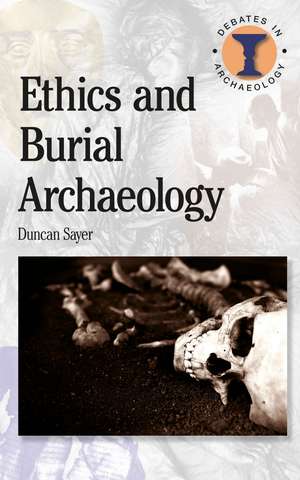Ethics and Burial Archaeology: Debates in Archaeology
Autor Duncan Sayeren Limba Engleză Paperback – 23 iun 2010
Din seria Debates in Archaeology
- 24%
 Preț: 170.07 lei
Preț: 170.07 lei - 24%
 Preț: 170.50 lei
Preț: 170.50 lei - 28%
 Preț: 466.81 lei
Preț: 466.81 lei - 14%
 Preț: 164.50 lei
Preț: 164.50 lei - 17%
 Preț: 171.76 lei
Preț: 171.76 lei - 17%
 Preț: 169.62 lei
Preț: 169.62 lei - 13%
 Preț: 248.61 lei
Preț: 248.61 lei - 18%
 Preț: 169.08 lei
Preț: 169.08 lei - 14%
 Preț: 163.42 lei
Preț: 163.42 lei - 30%
 Preț: 566.67 lei
Preț: 566.67 lei - 22%
 Preț: 594.35 lei
Preț: 594.35 lei - 24%
 Preț: 169.27 lei
Preț: 169.27 lei - 14%
 Preț: 169.27 lei
Preț: 169.27 lei - 24%
 Preț: 169.62 lei
Preț: 169.62 lei - 14%
 Preț: 170.69 lei
Preț: 170.69 lei - 13%
 Preț: 247.98 lei
Preț: 247.98 lei - 24%
 Preț: 168.74 lei
Preț: 168.74 lei - 14%
 Preț: 169.79 lei
Preț: 169.79 lei - 14%
 Preț: 247.22 lei
Preț: 247.22 lei - 18%
 Preț: 253.64 lei
Preț: 253.64 lei - 18%
 Preț: 169.44 lei
Preț: 169.44 lei - 14%
 Preț: 178.22 lei
Preț: 178.22 lei - 13%
 Preț: 247.98 lei
Preț: 247.98 lei - 17%
 Preț: 170.32 lei
Preț: 170.32 lei - 17%
 Preț: 170.07 lei
Preț: 170.07 lei - 17%
 Preț: 169.71 lei
Preț: 169.71 lei - 13%
 Preț: 149.87 lei
Preț: 149.87 lei - 14%
 Preț: 162.79 lei
Preț: 162.79 lei - 24%
 Preț: 169.71 lei
Preț: 169.71 lei - 14%
 Preț: 169.88 lei
Preț: 169.88 lei - 24%
 Preț: 170.07 lei
Preț: 170.07 lei - 24%
 Preț: 170.07 lei
Preț: 170.07 lei -
 Preț: 169.62 lei
Preț: 169.62 lei - 14%
 Preț: 169.62 lei
Preț: 169.62 lei - 14%
 Preț: 169.88 lei
Preț: 169.88 lei - 13%
 Preț: 149.87 lei
Preț: 149.87 lei - 30%
 Preț: 567.99 lei
Preț: 567.99 lei - 14%
 Preț: 170.32 lei
Preț: 170.32 lei - 23%
 Preț: 248.17 lei
Preț: 248.17 lei - 17%
 Preț: 169.71 lei
Preț: 169.71 lei - 30%
 Preț: 537.55 lei
Preț: 537.55 lei - 18%
 Preț: 169.27 lei
Preț: 169.27 lei - 13%
 Preț: 247.70 lei
Preț: 247.70 lei
Preț: 169.62 lei
Preț vechi: 222.51 lei
-24% Nou
Puncte Express: 254
Preț estimativ în valută:
32.46€ • 33.89$ • 26.86£
32.46€ • 33.89$ • 26.86£
Carte tipărită la comandă
Livrare economică 04-18 aprilie
Preluare comenzi: 021 569.72.76
Specificații
ISBN-13: 9780715638934
ISBN-10: 0715638939
Pagini: 156
Dimensiuni: 135 x 216 x 11 mm
Greutate: 0.2 kg
Editura: Bloomsbury Publishing
Colecția Bristol Classical Press
Seria Debates in Archaeology
Locul publicării:London, United Kingdom
ISBN-10: 0715638939
Pagini: 156
Dimensiuni: 135 x 216 x 11 mm
Greutate: 0.2 kg
Editura: Bloomsbury Publishing
Colecția Bristol Classical Press
Seria Debates in Archaeology
Locul publicării:London, United Kingdom
Notă biografică
Duncan Sayer is Lecturer in Archaeology at the University of Central Lancashire (UCLan). He is co-editor of "Mortuary Practice and Social Identities in the Middle Ages" (2009) and a founding member of the Association for the Study of Death and Society.
Recenzii
The book is very well detailed, insightful, educating and thought-provoking.
Descriere
The investigation of human remains has always been central to archaeological, but archaeologists are not the only ones with an interest in their treatment. This book sets a fresh agenda for ethical studies in mortuary investigation, adducing a series of case studies which can be used to understand the questions facing burial archaeology.
